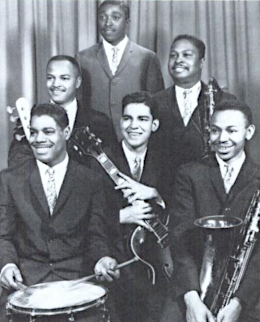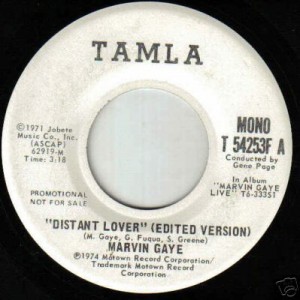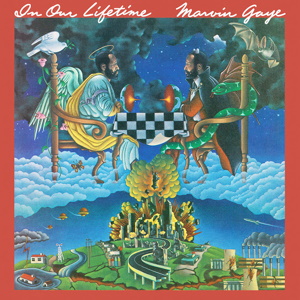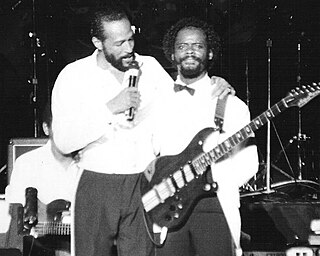Background
By the recording of Midnight Love, Gaye was influenced by the different musical styles that were dominating the pop music scene of the 1980s from synthpop and new wave artists such as Duran Duran to rock artists such as John Lennon, a pop music contemporary he was often compared to, reggae legend Bob Marley and funk/R&B artists such as Prince, Michael Jackson and Rick James. For this song, the musical style of James, which mixed styles of funk, synthpop and new wave particularly on James' biggest crossover hit, "Superfreak", influenced the direction of what became "Midnight Lady". In its alternate demo version, later released on the Midnight Love and the Sexual Healing Sessions album, its original working title is "Clique Games/Rick James".
According to biographer David Ritz, Gaye told him, "Most of my life happens after midnight. Call me the 'Midnight Man'." Gaye played on most of the instruments on the song except for drums by James Gadson, the horn section by David Stout and The L.A. Horn Section and guitar by Gordon Banks. In the song, Gaye references going to a party "last Saturday night" where "the club was rocking/superfreaks were hanging out/wall to wall" and "something's going on in the men's room". Throughout the song, Gaye continues referencing the woman he's after as a "superfreak". Lyrically wise and musically wise, the influence of "Superfreak" was prominent. In one verse, Gaye tells the woman, "somebody said you was a superfreak/I'm here to tell you I'm a superfreak, baby." Gaye would later admit he was influenced by James for the duration of the album as it progressed. The song was never released as a single but was issued as the first track off Midnight Love.

Funk is a music genre that originated in African American communities in the mid-1960s when musicians created a rhythmic, danceable new form of music through a mixture of various music genres that were popular among African Americans in the mid-20th century. It de-emphasizes melody and chord progressions and focuses on a strong rhythmic groove of a bassline played by an electric bassist and a drum part played by a percussionist, often at slower tempos than other popular music. Funk typically consists of a complex percussive groove with rhythm instruments playing interlocking grooves that create a "hypnotic" and "danceable" feel. Funk uses the same richly colored extended chords found in bebop jazz, such as minor chords with added sevenths and elevenths, or dominant seventh chords with altered ninths and thirteenths.

The Funk Brothers were a group of Detroit-based session musicians who performed the backing to most Motown recordings from 1959 until the company moved to Los Angeles in 1972.

Manteca is a Canadian jazz fusion band that toured during the 1980s and 1990s. It was formed by percussionist Matt Zimbel and bassist Henry Heillig in 1979.

"I Heard It Through the Grapevine" is a song written by Norman Whitfield and Barrett Strong for Motown Records in 1966. The first recording of the song to be released was produced by Whitfield for Gladys Knight & the Pips and released as a single in September 1967. It went to number one on the Billboard R&B Singles chart and number two on the Billboard Pop Singles chart and shortly became the biggest selling Motown single up to that time.

Let's Get It On is the thirteenth studio album by American soul singer, songwriter, and producer Marvin Gaye. It was released on August 28, 1973, by the Motown subsidiary label Tamla Records on LP.

"Got to Give It Up" is a song by American music artist Marvin Gaye. Written by the singer and produced by Art Stewart as a response to a request from Gaye's record label that he perform disco music, it was released in March 1977.

I Want You is the fourteenth studio album by American soul singer and songwriter Marvin Gaye. It was released on March 16, 1976, by the Motown Records-subsidiary label Tamla.

"Distant Lover" is the sixth song issued on singer Marvin Gaye's 1973 album, Let's Get It On and the B-side of the second single from that album, "Come Get to This". A live recording was issued as a single in 1974. The live version of the song was Gaye's most successful single during the three-year gap between Let's Get It On and his following 1976 album, I Want You.

Midnight Love is the seventeenth studio album by Marvin Gaye and the final album to be released during his lifetime. He signed with the label Columbia in March 1982 following his exit from Motown.

In Our Lifetime? is the sixteenth studio album by soul musician Marvin Gaye, released January 15, 1981, on Motown label Tamla Records. Recording sessions for the album took place at Marvin's Room in Los Angeles, California, Seawest Recording Studio in Honolulu, Hawaii, and at Odyssey Studios in London, England, throughout 1979 and 1980. The album cover was designed by Neil Breeden. Gaye's final album for Motown before leaving for Columbia Records, the album was the follow-up to the commercial failure of Here, My Dear, a double album which chronicled the singer's divorce from Anna Gordy. Entirely written, produced, arranged, and mixed by Gaye, In Our Lifetime? was a departure for Gaye from the disco stylings of his previous two studio efforts and was seen as one of the best albums of the singer's late-Motown period.

Dream of a Lifetime is the eighteenth and first posthumously released studio album by the American recording artist Marvin Gaye. It included the top five R&B single, "Sanctified Lady".
Funk rock is a fusion genre that mixes elements of funk and rock. James Brown and others declared that Little Richard and his mid-1950s road band, The Upsetters, were the first to put the funk in the rock and roll beat, with a biographer stating that their music "spark[ed] the musical transition from fifties rock and roll to sixties funk."
"Far Cry" is the infamous unfinished recording that was included on singer Marvin Gaye's 1981 final Motown album, In Our Lifetime. The song, essentially a funk-styled instrumental, featured a vocally conscious Gaye mouthing words while playing multiple instruments, including the drums and keyboards, on the first part of the song. The brief second half features a jazz instrumental with Gaye playing piano and drums and singing in falsetto, while his fellow instrumentalists, bassist Frank Blair and guitarist Gordon Banks, accompany him. The song's release among the eight original recordings on In Our Lifetime angered Marvin to the point where he severed ties with Motown, his home for twenty years, leaving the label for Columbia. As he told his biographer David Ritz,
"I hadn't completed it....The song was in its most primitive stage. All I had was this jive vocal track, and they put it out as a finished fact. How could they embarrass me like that? I was humiliated. They also added guitar licks and bass lines. How dare they second guess my artistic decisions! Can you imagine saying to an artist, say Picasso, 'Okay, Pablo, you've been fooling with this picture long enough. We'll take your unfinished canvas and add a leg here, an arm there. You might be the artist, but you're behind schedule, so we'll finish up this painting for you. If you don't like the results, Pablo, baby, that's touch!'"
"'Til Tomorrow" is a 1982 R&B/soul quiet storm-styled song recorded by American singer Marvin Gaye. The song was the second US single off Midnight Love released in February 1983. The release also served as a promotional song as Gaye prepped for a U.S. tour in the year of its release.

Gordon Banks, a.k.a. Gordon 'Guitar' Banks, is an American guitarist, producer, writer and musical director. He was voted one of the top 100 guitarists in America by Rolling Stone magazine in 1985.
James Gadson is an American drummer and session musician. Beginning his career in the late 1960s, Gadson has since become one of the most-recorded drummers in the history of R&B. He is also a singer and songwriter.
Boogie is a rhythm and blues genre of electronic dance music with close ties to the post-disco style, that first emerged in the United States during the late 1970s to mid-1980s. The sound of boogie is defined by bridging acoustic and electronic musical instruments with emphasis on vocals and miscellaneous effects. It later evolved into electro and house music.
Art Stewart is an American record producer, audio engineer, and composer who has worked on many Motown recordings. He worked on the Blue album by Diana Ross, and recordings by Teena Marie, including her Wild and Peaceful album, released in 1979. With Marvin Gaye, he has worked on the Let's Get It On album and Gaye's single "Got to Give It Up". He has also worked with Rick James on his Motown debut album Come Get It!, and his second Motown album, Bustin' Out of L Seven.
"Masochistic Beauty" is a song by American soul singer Marvin Gaye, released posthumously in 1985 by Columbia Records.











